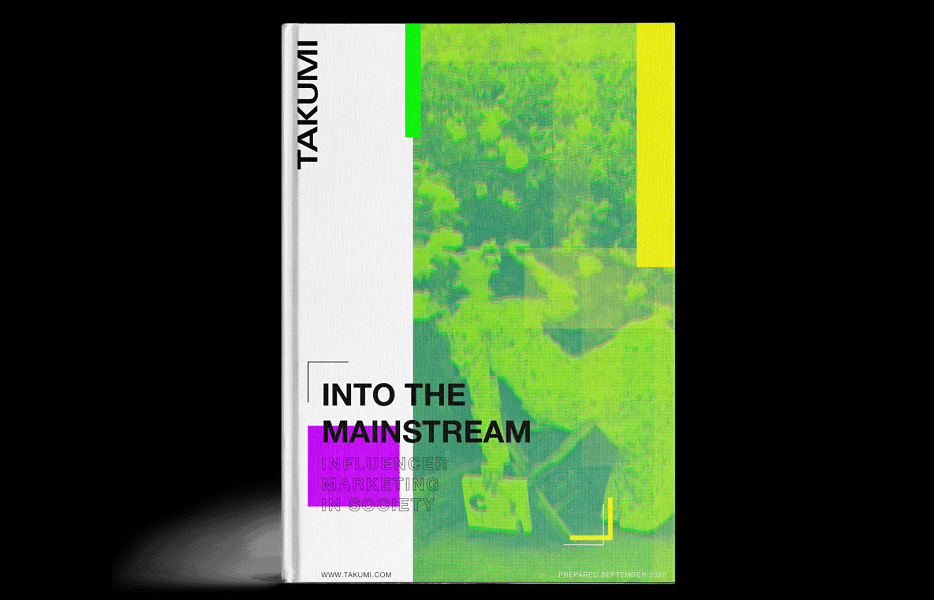
The industry report from global influencer marketing agency, TAKUMI, surveyed more than 3,500 consumers, influencers, and marketers across the UK, US and Germany, focusing on ethics, diversity, misinformation, and new channels.
Nearly three quarters (73%) of marketers allocated more resources to influencer marketing in the last 12-months, while consumers are increasingly going to influencers for news information.
Key findings
- 73% of marketers in US, UK, and Germany allocated more resources to influencer marketing in the last 12 months, engaging talent across a wider channel mix including OOH (83.3%), print (80%) and TV & radio (81.3%)
- 41% of consumers agree that social media influencers should use their platforms to discuss current affairs and everyday activism, but 55% of marketers said they’d be anxious about working with an influencer who is vocal about social and political issues
- Over half of influencers in all three markets ranked diversity as the number one issue that needs to be considered by marketers
- A quarter of consumers are more likely to source news updates and opinions from influencers than journalists and established news outlets
The report, ‘Into the mainstream: Influencer marketing in society’ uncovers opinions on ethics, diversity, misinformation, and new channels.
Marketers spending more on influencer marketing than they were a year ago
In the last 12 months, almost three-quarters of the marketers we spoke to (73%) have allocated more resources to influencer marketing, with spend particularly increasing in the retail (79%), legal (79%), and manufacturing (75%) sectors. Brands are also working with influencers across more mainstream advertising channels including OOH (83.3%), print (80%) and TV & radio (81.3%). Consumers are equally receptive to this shift: over a third (38%) are open to seeing influencers incorporated into traditional advertising.
Marketers are also exploring additional social media channels: over the next year, 58% of marketers are considering working with influencers on YouTube, followed by a further 55% on Instagram, 35% on TikTok, 20% on Twitch, and 10% on Triller.
Influencer marketing delivering better ROI than traditional advertising channels
A quarter (25%) of 16-24-year-olds say Instagram is the most likely advertising platform to lead to a purchase and our research shows that marketers recognise the strong ROI potential, with almost two-thirds (60%) agreeing that influencer marketing provides better ROI for brand marketing campaigns compared with traditional advertising.
Influencers acting as a news source
Nearly a quarter of consumers in the UK (24%) and Germany (23%), and 28% of US consumers are more likely to source news updates and opinions from influencers than journalists and established news outlets, rising to more than a third of 16-24-year-olds (38%), 25-34-year-olds (38%), and 35-44-year-olds (34%). With this in mind, it’s unsurprising that 41% of consumers agree that social media influencers should use their platforms to discuss current affairs and everyday activism.
32% of consumers across the UK, US, and Germany find influencer content more relatable to their real lives than content produced by brands, which explain the desire for current-affairs driven content.
As reflected by the Black Lives Matter movement: more than 50% of all content creators we surveyed said also that diversity was the number one issue that needs to be addressed by marketers and brands moving forward. Similarly, a quarter of influencers (25%) want to establish relationships with brands who are aligned with their moral standpoints – across diversity, the environment, and social issues.
Despite this, over half (55%) of marketers across the UK, US and Germany said they would be anxious about working with an influencer who is vocal about social and political issues.
Mary Keane-Dawson, Group CEO of TAKUMI, said: “With 73% of marketers upping spend in influencer marketing, it is clearly a core pillar of any effective brand marketing strategy. We’ve known for a long-time that being platform-agnostic equals success with influencer marketing, which is why we launched TAKUMI X. And it appears marketers are starting to realise this too. They are now exploring new social media channels – such as TikTok – and are integrating creator content into their wider marketing mix including TV and OOH in line with consumer appetites.
“Despite growth, the industry cannot rest on its laurels. With conversations around diversity, equality and inclusivity gaining momentum in the industry and wider society, it’s clear that consumers are hungry for influencer marketing with a social conscience. Marketers need to consider how their influencer campaigns will champion progress and reflect the real lives and concerns of consumers if they want to remain relevant and compelling.”
The full study can be read here
Report methodology
In August 2020, TAKUMI commissioned and executed this research based on 3,592 respondents.TAKUMI conducted research via online surveys, interviews and focus groups.Survey Monkey was commissioned by TAKUMI to execute a study of 291 influencers in the UK, US and Germany.
Censuswide was commissioned by TAKUMI to execute a study of 3,010 nationally representative consumers (aged 16+) and 756 marketers in the UK, US and Germany. Censuswide abide by and employ members of the Market Research Society which is based on the ESOMAR principles.
